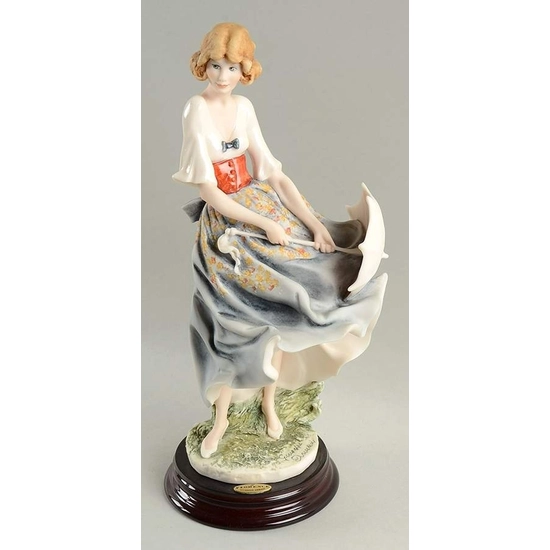Giuseppe Armani Mariah 2001 Figurine Sculpture 1407C
Status: In Stock | Condition: New | Edition:Open Edition Sculpture | Edition Size: Open Edition | Dim:9 5/8 inches | Giuseppe Armani| Item #: 1407C
Price: $ 550.00 USD..
Or choose our in-store layaway option with three equal payments of $183.33 made every 30 days over a period of three months
Layaway Details Here.
Giuseppe Armani Mariah 2001 Figurine Sculpture is eligible for 3 equal layaway payments in store, with a credit card of $183.33 made every 30 days over a period of three months....
1/22/2025 $183.33 1st payment
2/21/2025 $183.33 2nd payment
3/23/2025 $183.33 3rd & final payment
payments are automatically deducted from your credit card.
Get Your Cost for International Delivery.
🇦🇺
🇦🇹
🇩🇰
🇫🇮
🇫🇷
🇩🇪
🇮🇪
🇮🇹
🇯🇵
🇳🇱
🇳🇴
🇪🇸
🇸🇪
🇨🇭
🇬🇧
Within The Continental USA Only
Available for
purchase
today, January 22, 2025
No Sales Tax Except In The State Of Florida.
All products are shipped from our US Warehouse.
As an option you may also pay for Giuseppe Armani Mariah 2001 Figurine
Sculpture
using Paypal or with your Amazon Account(*select items). Please note that all orders must be delivered to a physical address verified by Paypal or Amazon. .
MARIAH 2001 FIGURINE RETIRE 2002 - 1407C
NOTES: MARIAH 2001 FIGURINE RETIRE 2002.
Mariah 2001 Figurine 1407C Sculpture by Giuseppe Armani
comes in the original Armani packaging.
image Copyright © 2025 by Giuseppe Armani
***Armani Sculptures sold by the The Collection Shop are all the original, genuine Armani Figurines made in Florence Italy.***

Gift Card Purchase
E-Gift Cards from The Collection Shop are the perfect way to gift art enthusiasts. Click below for more details!
Giuseppe Armani bio
Giuseppe Armani was born in Calci, Italy, in 1935. From the moment young 'Bebe' could pick up a pencil, he drew. He drew everything he saw. He drew everyone he knew. He drew all day long. Armani's parents were amazed at Giuseppe's prodigious output and they recognized that their little boy's sketches were more than just the whimsical drawings of most children. Uncanny realism and attention to detail revealed Giuseppe's true talent. He had The Gift. Giuseppe's teachers decided that Armani should attend the Academy of Fine Arts in Florence. Unfortunately, as the arrangements were being made, his father died unexpectedly. The family needed Giuseppe now. Art school was forgotten. But the Art was not. Giuseppe Armani's natural talent was finally recognized when a local priest organized an exhibition of young artists; Giuseppe entered a sculpture of a classically inspired male torso. The work was greatly admired for its extraordinary anatomical precision. When the torso was taken to the Art Gallery in Pisa -- located across the street from the famous Leaning Tower -- Giuseppe Armani's talent was rewarded with the offer of a permanent job there. In Pisa, Armani's dream of studying art was finally realized. He immersed himself in the great masterpieces of the Renaissance that he had only read about in books. He travelled to Siena and Florence and began to hone his personal style; Giuseppe drew heavily on the style of 16th Century Florentine Renaissance. Sculpture, Armani realized, allowed him to work in three dimensions. He infused life, character and even soul into his works. Giuseppe experimented in wood, clay, alabaster and marble and his reputation grew with each breathtaking creation. Art admirers soon started flocking to the gallery to see Armani's latest efforts. In 1975, the Florence Sculture d'Arte, recognizing Armani's genius, offered him the opportunity to work exclusively for them. He would be encouraged to give free rein to his artistic muse. Giuseppe Armani accepted. For more than 20 years Armani has created masterpieces ranging from traditional Capodimonte style to more daring, contemporary, sometimes whimsical sculptures. Always, Giuseppe infused his figurines with breathtaking realism -- with a spark of life. This continues to amaze even his many admirers the world over. Giuseppe Armani describes his credo this way: "Although I consider myself a direct descendant of the Renaissance heritage, I believe that an artist has to follow his own evolution and not solely be a ruminant of the past, as glorious as it may have been. An artist conducts a search that may lead him far out in exploring new areas of interest. I continually search to discover new and better means of expression.


